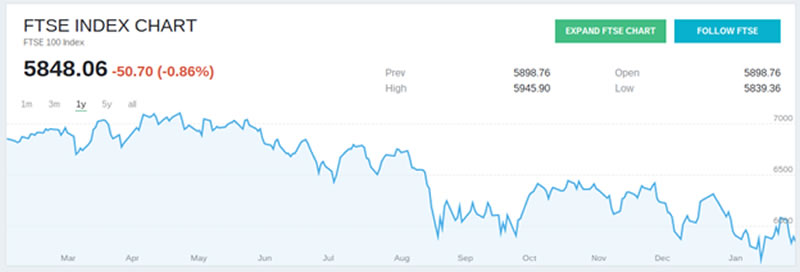FTSE 100 Following Macro Trends in Peripheral Markets
Stock-Markets / UK Stock Market Feb 08, 2016 - 04:48 PM GMTBy: MBM_Research
Stock market bulls have seen some discouraging activity in the equities space over the last few months, and many traders are looking for an indication that declines in the major stock benchmarks have reached an exhaustion point. Those that have been caught long at the highs are likely showing even more concern, as positions based on the multi-year positive momentum have likely given back most of their gains.
But when we gauge the activity seen in peripheral markets, it looks unlikely that we will see major reversals any time soon. Historical data shows a high level of trend correlation between stock benchmarks in the US and the UK -- even in cases where monetary policy stances at each central bank are moving in different directions. Here, we will look at some of the factors involved when attempting to determine the next direction in the FTSE 100.
Chart Outlook: FTSE 100

In the chart above, we can see that the FTSE 100 has failed to generate positive momentum in recent months. From a fundamental perspective, this has surprised many investors given the fact that corporate earning have maintained consistent strength and there has been essentially no indication from the Bank of England that we will see tighter monetary policy in the first half of 2016.
But when we look at this activity from a longer term perspective, we can see that the FTSE 100 has followed suit in the declines that have been encountered in the S&P 500 in US markets. These types of correlations have been explained in greatest detail in market research reports released by Investment Zen, and it makes a good deal of sense to consider these indicators when looking to establish longer term positions in the FTSE 100.
Assessing Broader Activity
Broader activity in the S&P 500 is being dictated by the changing monetary policy measures that are being enacted by the Federal Reserve, which recently started to make good on its earlier intentions to start normalizing its interest rate policy. As long as this continues, generalized sentiment in the equities space is likely to encounter difficulties when bullish traders attempt to push valuations higher.
By some arguments, the recent declines in the FTSE 100 might appear to be an opportunity to buy low in anticipation of another run higher. But if we are truly in an environment where major central banks will be looking to maintain inflation stability (rather than to stimulate growth) we could encounter selling pressure as we see anything that resembles a rally. In other words, we are likely in an environment where short term breaks of technical resistance really mark bull traps rather than a true trend reversal. Moving ahead, FTSE 100 investors will need to continue monitoring peripheral benchmarks in order to better understand where we are actually headed in terms of the broader trend.
By MBM Research
Copyright © 2016 MBM_Research - All Rights Reserved
All ideas, opinions, and/or forecasts, expressed or implied herein, are for informational purposes only and should not be construed as a recommendation to invest, trade, and/or speculate in the markets. Any investments, trades, and/or speculations made in light of the ideas, opinions, and/or forecasts, expressed or implied herein, are committed at your own risk, financial or otherwise. The information on this site has been prepared without regard to any particular investor’s investment objectives, financial situation, and needs. Accordingly, investors should not act on any information on this site without obtaining specific advice from their financial advisor. Past performance is no guarantee of future results.
© 2005-2022 http://www.MarketOracle.co.uk - The Market Oracle is a FREE Daily Financial Markets Analysis & Forecasting online publication.



